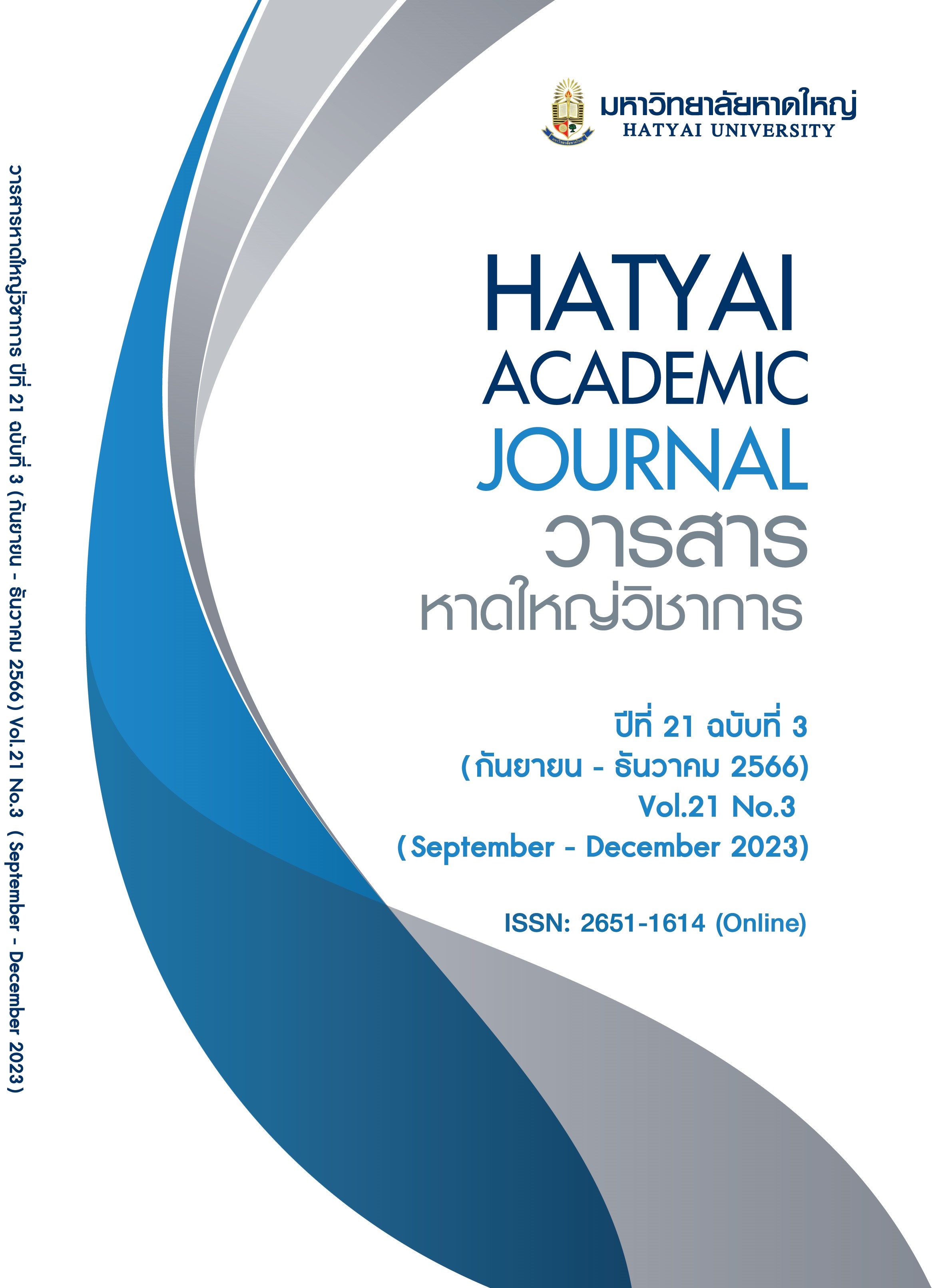The Effectiveness of Work Performance of Academic Staff at Rajabhat Universities in Thailand
Main Article Content
Abstract
University ranking is an indicator of evaluating the performance of quality universities. The evaluation concerns the four key abilities: teaching, research, academic services, and preserving art and culture. This research aimed to study 1) the levels of transformational leadership, organizational climate, job satisfaction, employee commitment, and employee performance, 2) the influence of previous aspects towards employee preformance, and 3) employee performance of the academic staff model development. This research employed mixed-method techniques, quantitative and qualitative research methods. The sample group of this research was 441 academic staff who were classified by cluster sampling. Data were collected through a questionnaire and analyzed through Structural Equational Modeling Analysis. In addition, this qualitative research used a focus group discussion. The research found that 1) levels of transformational leadership of academic staff were highest, whereas organization climate, job satisfaction, employee commitment, and employee performance were high, 2) transformational leadership, organization climate, job satisfaction, and employee commitment significantly influenced the employee performance with significance level at .05, and 3) the employee performance model of the academic staff of Rajabhat Universities developed by the researcher was named the TOJEE Model (T = Transformational Leadership, O = Organization Climate, J = Job Satisfaction, E = Employee Commitment, E = Employee). This model supported the key abilities of academic staff and produced excellence at Rajabhat Universities that followed the direction and the requirement of the country.
Article Details

This work is licensed under a Creative Commons Attribution-NonCommercial-NoDerivatives 4.0 International License.
All published articles are evaluated by three qualified peer reviewers from various institutions through a double-blind process, where reviewers do not know the authors’ identities and authors do not know the reviewers’ identities. The content and articles in the Hatyai Academic Journal reflect the authors’ views only and are neither the opinions of the editorial board nor the responsibility of Hatyai University. The Editorial Board of the Hatyai Academic Journal allows articles to be reproduced for academic purposes, on the condition that the original source is clearly cited.
References
Alonderiene, R., & Majauskaite, M. (2016). Leadership style and job satisfaction in higher education institutions. International Journal of Educational Management, 30(1), 140-164.
Bass, B. M., & Bass, R. (2008). The bass handbook of leadership: Theory, research, and managerial application. New York: Free Press.
Bhandarker, A., & Rai, S. (2015). Positive transformational leadership: Case study of an Indian public sector bank. Asia-Pacific Journal of Business Administration, 7(1), 34-55.
Blanz, M. (2017). Employees’ job satisfaction: A test of the job characteristics model among social work practitioners. Journal of Evidence-Informed Social Work, 14(1), 35-50.
Chaudhary, R., Rangnekar, S., & Barua, M. K. (2014). Organizational climate, climate strength and work engagement. Procedia - Social and Behavioral Sciences, 133, 291-303.
Dartey-Baah, K., & Ampofo, E. (2016). “Carrot and stick” leadership style can it predict employees’ job satisfaction in a contemporary business organisation?. African Journal of Economic and Management Studies, 7(3), 328-345.
Fornell, C., & Larcker, D. F. (1981). Evaluating structural equation models with unobservable variables and measurement error. Journal of Marketing Research, 18(1), 39-50. https://doi.org/10.2307/3151312
Frederick, H. (1959). The Motivation to work. New York: John Wiley and Sons.
Hair, J. F., Black, W. C., Babin, B. J., & Anderson, R. E. (2010). Multivariate data analysis (7th ed.). Upper Saddle River: Pearson Education.
Jyoti, J. (2014). Impact of organizational climate on job satisfaction, job commitment and intention to leave: An empirical model. Journal of Business Theory and Practice, 1(1), 157-165.
Kao, R. H. (2016). The relationship between work characteristics and changeoriented organizational citizenship behavior a multi-level study on transformational leadership and organizational climate in immigration workers. Personnel Review, 46(8), 1890-1914.
Kelloway, E. K. (1998). Using LISREL for structural equation modeling: A researcher’s guide. Thousand Oaks, CA: SAGE Publications.
Kim, E. J., & Park, S. (2020). Transformational leadership, knowledge sharing, organizational climate and learning: An empirical study. Leadership & Organization Development Journal, 41(6), 761-775.
Kline, R. B. (2016). Principles and practice of structural equation modeling (4th ed.). New York: The Guilford.
Litwin, G. H., & Stringer, R. A. (1974). Motivation and organizational climate (3rd ed.). Boston: Harvard University Press.
Mansour, J. B., Naji, A., & Leclerc, A. (2017). The relationship between training satisfaction and the readiness to transfer learning: The mediating role of normative commitment. Sustainability, 9(5), 1-14. doi:10.3390/su9050834
Meyer, J. P., & Allen, N. J. (1991). A three-component conceptualization of organizational commitment. Human Resource Management Review, 1(1), 61-89.
Philippaers, K., Cuyper, N. D., & Forrier, A. (2019). Employability and performance: The role of perceived control and affective organizational commitment. Personnel Review, 48(5), 1299-1317.
Ribeiro, N., Yücel, I., & Gomes, D. (2018). How transformational leadership predicts employees’ affective commitment and performance. International Journal of Productivity and Performance Management, 67(9), 1901-1917.
Saleem, M. A., Bhutta, Z. M., Nauman, M., & Zahra, S. (2019). Enhancing performance and commitment through leadership and empowerment: An emerging economy perspective. International Journal of Bank Marketing, 37(1), 303-322.
Soomro, B. A., & Shah, N. (2019). Determining the impact of entrepreneurial orientation and organizational culture on job satisfaction, organizational commitment, and employee’s performance. South Asian Journal of Business Studies, 8(3), 266-282.
Taba, M. I. (2018). Mediating effect of work performance and organizational commitment in the relationship between reward system and employees’ work satisfaction. Journal of Management Development, 37(1), 65-75.
Torlak, N. G., & Kuzey, C. (2019). Leadership, job satisfaction and performance links in private education institutes of Pakistan. International Journal of Productivity and Performance Management, 68(2), 276-295.
Tsai, C. L. (2014). The organizational climate and employees’ job satisfaction in the terminal operation context of kaohsiung port. The Asian Journal of Shipping and Logistics, 30(3), 373-392.
Wang, G. Oh, I. S., Courtright, S. H., & Colbert, A. E. (2011). Transformational leadership and performance across criteria and levels: A meta-analytic review of 25 years of research, Group & Organization Management, 36(2), 223-270.


